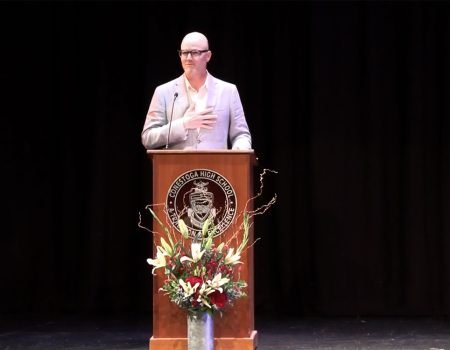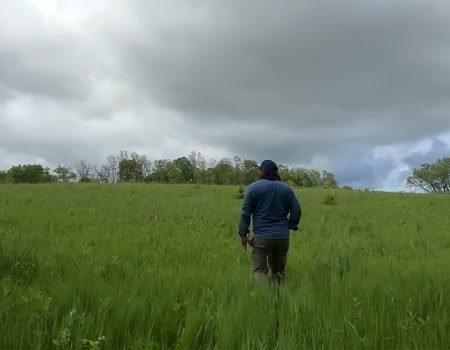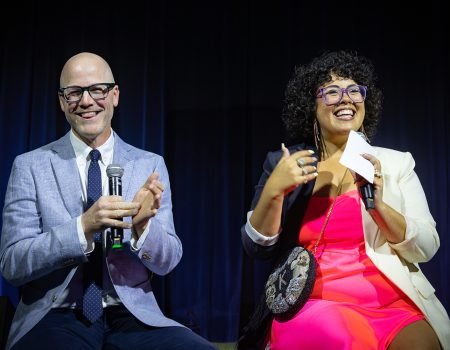Edward R. Murrow & The Birth of Broadcast Journalism
I thought I had the job.
It was the spring of 1996. I was writing freelance for Rolling Stone Online for fifty bucks an article. I’d graduated from Syracuse’s Newhouse School of Communications two years prior. I’d been in New York City less than six months.
I was green. Like, flourescent green.
I was dizzy in those days. The City was too much for me then. I walked everywhere as quickly as possible, afraid of the crowds, and afraid of getting lost on the subway. I had two new suits from Today’s Man (TM) that I wore everywhere. I showed up for a job interview once having sweat clear though my dress shirt.
So there I was at 1290 Avenue of the Americas: The Rolling Stone Home Office. I never could have imagined it as a kid. But there I was reviewing Weezer shows, interviewing Ben Folds, and hanging backstage with Buffalo Tom. I never could have imagined it as a kid. But there I was, being ushered into Bob Love’s office for a job interview.
I called my mother from a phone box on 52d & Broadway, right next to the Ed Sullivan Theater, to share the news. It was drizzling.
“You’ll never believe what just happened!”
Cut to: Present tense, dusk. The sky is clear, and the air is cool as I exit the Museum of Television & Radio on 52d Street just a few feet below the office formerly known as Bob Love’s. I am fresh from a Q&A with NPR legend Bob Edwards who is on tour in support of his book, ‘Edward R. Murrow & The Birth of Broadcast Journalism.’
Murrow brought WWII into America’s living room. His news hour, ‘See It Now,’ broadcast the first live images of each coast concurrently. America was wired from the Golden Gate to the Brooklyn Bridge for the first time in the program’s 1951 premiere. And Murrow wielded the medium like an axe. “This weapon of television could be useful,” he once said.
But not for long. His 1954 editorial against Senator Joseph McCarthy would be his finest hour, and his last.
“Your job gives me a stomach ache,” his Boss, James Paley, told him.
“It comes with the job,” Murrow replied.
He was off the air shortly there after.
Edwards continued in Murrow’s tradition: hard-earned, balanced and fair reportage; substance over form; news without commercial considerations. What had it earned Murrow? “Canceled by the Campbell’s Soup Company,” Edwards deadpanned. And where did it get Edwards? Thirty years after founding ‘Morning Edition’ on solid reportage and thoughtful interviews, he was replaced by two correspondents: one in New York, and one in L.A.
L.A. Hollywood. The Business. That’s where it’s at, right? That’s where Pat O’Brien and Joan Rivers ply their trades, and that’s where the Battle For Journalistic Integrity is lost. See Brian Williams, over there on the MSNBC, reporting on the Michael Jackson case? And look, over there! It’s Dan Rather reporting on the Kobe Bryant trial! Say, Peter Jennings, what did you think of Diane Sawyers dress at the Oscars?
Listen, I’m no purist. I’m not so much green and light brown. I get it. I know what I do. And I know what I came here to do. That said, what are we supposed to do? Or is the future of our broadcasted reality really paved with red carpets, PowerBall, and scripted presidential press conferences?
“I guess I’m just hoping that it all gets so bad that it just bottoms out,” Edwards said tonight.
Maybe I’m accelerating our descent, one Britney Spears article after another. Maybe we’re inches from rock bottom, thanks to yet another Lindsay Lohan feature. Maybe that Grammy Fashion Feature I produced will be the death of us all.
Or maybe the one pro-social article I pitch — say, blogging against Bush — for every dozen fluffy headlines, or every heart-felt song I put forth, or every question-laden Daily Journal post … maybe it’s of some use.
Heck, maybe it’s good that I didn’t get the job. (Or did I?)
“It all depends on how you vote with your eyes and ears,” Edwards said tonight.
Good night. And good luck.



